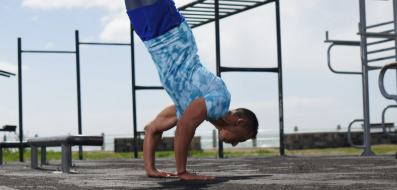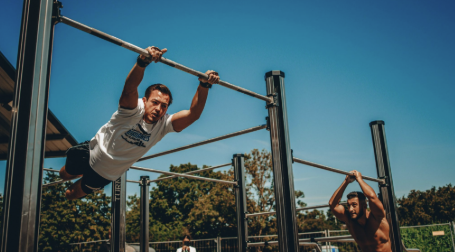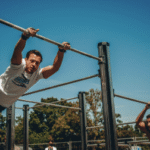Fueling Your Progress: Nutrition for Private Calisthenics Clients in Houston
You’ve made the investment in private calisthenics coaching, a commitment to mastering your bodyweight and building incredible functional strength. While your coach is the architect of your training plan, the building materials for your success are found in your kitchen. In calisthenics, nutrition isn’t just a component of your progress—it’s the very foundation.
A private coach’s role extends beyond the gym; they provide a blueprint for how to eat for performance. This isn’t about restrictive dieting; it’s about a strategic, personalized approach to fueling your body for the unique demands of bodyweight mastery. This guide details the core principles your coach will work with you to implement.
The Philosophy: Building a Body That Performs
The goal of calisthenics nutrition is different from that of traditional bodybuilding. We are not just building size; we are building a lean, powerful, and efficient machine. The aim is to maximize your strength-to-weight ratio.
This means fueling your body to:
Build and repair lean muscle tissue without adding unnecessary body fat.
Provide sustained energy for high-intensity skill work and strength training.
Support joint and tendon health to prevent injuries.
Enhance recovery so you can come back stronger for your next session.
Pillar 1: The Macronutrient Blueprint for Strength
Your coach will help you dial in the three key macronutrients. The exact amounts are personalized, but the principles are universal.
- Protein: The Master Builder
Why it’s crucial: Every time you train, you create micro-tears in your muscle fibers. Protein provides the amino acids—the “building blocks”—to repair these tears and rebuild your muscles stronger and more resilient. Without adequate protein, you are simply breaking your body down without giving it the tools to rebuild.
How much? A common target for active individuals is 0.8 to 1 gram of protein per pound of your target body weight (or 1.6 to 2.2 grams per kilogram).
High-Quality Sources:
Lean Meats: Chicken breast, turkey, lean ground beef.
Fish: Salmon (rich in omega-3s), tuna, tilapia.
Eggs: A complete protein source.
Dairy: Greek yogurt, cottage cheese.
Plant-Based: Lentils, chickpeas, quinoa, tofu, edamame.
- Carbohydrates: The High-Performance Fuel
Why it’s crucial: Carbs are your body’s primary and most efficient energy source. They are stored in your muscles as glycogen, which is the fuel you burn during intense efforts like explosive pull-ups or handstand push-ups. A low-carb diet can leave you feeling weak and flat during your workouts.
What kind? Focus on complex carbohydrates that provide sustained energy.
High-Quality Sources:
Oats, brown rice, quinoa.
Sweet potatoes, yams.
Whole-grain bread.
Fruits (like bananas and berries) are excellent around workout times.
- Healthy Fats: The Hormone and Joint Support System
Why it’s crucial: Healthy fats are essential for producing hormones, including those vital for muscle growth and recovery (like testosterone). They also play a key role in reducing inflammation and supporting joint health, which is critical for the high demands of calisthenics.
How much? Generally, about 20-30% of your total daily calories should come from healthy fats.
High-Quality Sources:
Avocados, olive oil, nuts (almonds, walnuts), and seeds (chia, flax).
Pillar 2: Nutrient Timing – Fueling for Performance and Recovery
A private coach will help you structure your meals around your training sessions to maximize your performance and recovery.
Pre-Workout (1-2 hours before your session):
Goal: To top off your energy stores and provide your muscles with readily available amino acids.
What to eat: A combination of easily digestible carbohydrates and some protein.
Houston-friendly examples: A banana with a scoop of almond butter; a bowl of oatmeal; Greek yogurt with berries.
Post-Workout (Within 1-2 hours after your session):
Goal: To kick-start the muscle repair process and replenish your energy stores.
What to eat: A meal rich in high-quality protein and carbohydrates.
Examples: A whey protein shake with a piece of fruit is a quick and effective option. A full meal like grilled salmon with quinoa and roasted vegetables is ideal.
Pillar 3: Hydration – The Non-Negotiable for Houston Athletes
In Houston’s heat and humidity, hydration isn’t just important—it’s critical.
Why it’s crucial: Even slight dehydration can drastically reduce your strength, endurance, and coordination, increasing your risk of injury. Water is essential for transporting nutrients to your muscles and flushing out metabolic waste.
How much? Aim for at least half your body weight in ounces of water per day as a baseline, and increase that amount on training days. For a 180 lb person, that’s at least 90 oz (about 2.7 liters).
Electrolytes: For intense sessions where you’re sweating a lot, a coach may recommend adding an electrolyte supplement to replenish the sodium and potassium you lose.
The Private Coaching Difference: Your Personalized Plan
This is where a coach truly separates themselves from a generic app or online plan. They will work with you to:
Calculate Your Specific Needs: Based on your assessment, they will help you determine your specific daily calorie and macronutrient targets.
Build Sustainable Habits: A coach won’t just give you a rigid meal plan. They will teach you the principles of healthy eating and help you build habits that fit into your busy Houston lifestyle.
Track and Adjust: They will monitor your progress, energy levels, and performance, and make adjustments to your nutrition plan as needed to ensure you continue to progress without hitting a plateau.
Conclusion:
Fueling your progress in calisthenics is a science. While the training in your private sessions provides the stimulus, it is the personalized nutrition strategy that provides the resources for your body to adapt, grow, and perform. By working with your coach to master these principles, you ensure that every ounce of effort you put into your training is translated into real, tangible results.

Fueling Your Progress: Nutrition for Private Calisthenics Clients in Houston
Route
Calisthenics Gym Houston Functional Bodyweight Training
Secondary phone: (346) 483-3195
Email: info@calisthenicsclubhouston.com
URL: https://calisthenicsclubhouston.com/
Monday 6:00 AM - 7:00 PM Tuesday 6:00 AM - 7:00 PM Wednesday 6:00 AM - 7:00 PM Thursday 6:00 AM - 7:00 PM Friday 12:00 PM - 6:30 PM Open now Saturday 9:45 AM - 12:00 PM Sunday 3:00 PM - 5:00 PM







